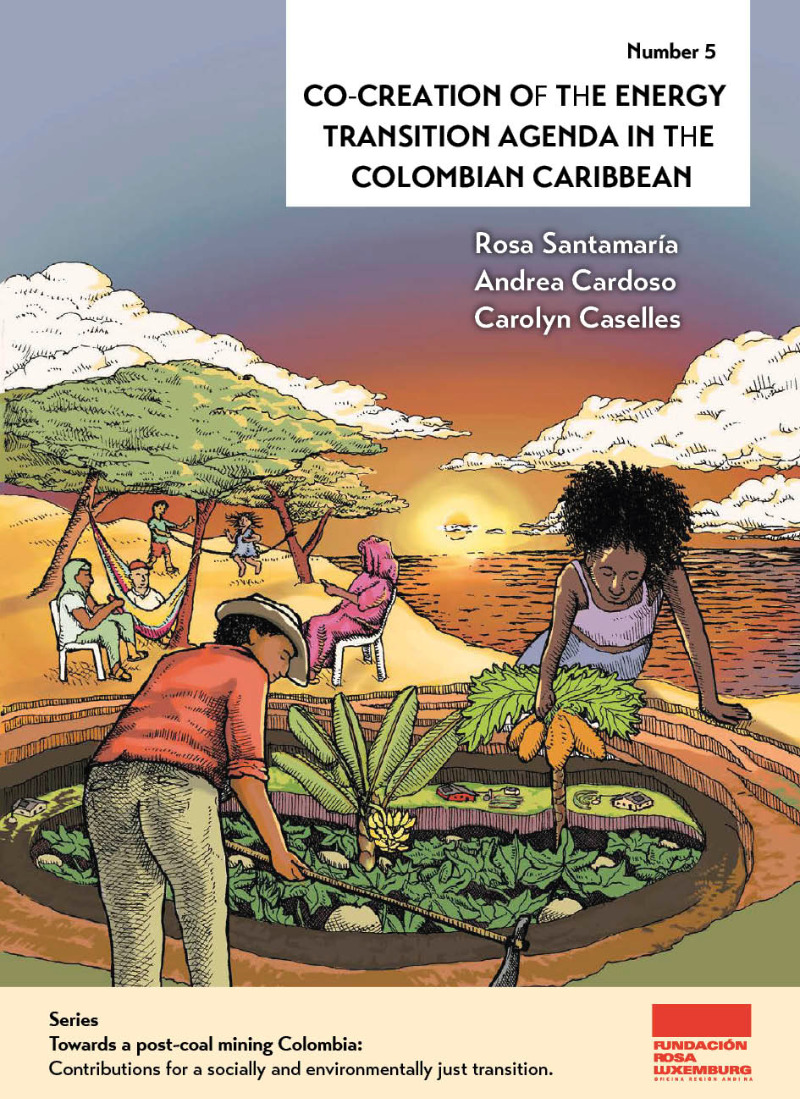
Co-creation of the energy transition agenda in the colombian caribbean
| Autores: | Santamaría Guerrero, Rosa Cardoso Díaz, Andrea Caselles Martínez, Carolyn |
| Colaborador: | Arbeláez Duque, Juan Fernando (Traductor) |
Materia:333.7 - Recursos naturales y energía
Clasificación Thema::T - Tecnología, ingeniería, agricultura, procesos industriales
R - Ciencias de la Tierra, geografía, medioambiente, planificación
Público objetivo:Profesional / académico
Disponibilidad:Disponible
Estatus en catálogo:Próxima aparición
Publicado:2022-02-03
Número de edición:1
Número de páginas:0
Tamaño:20Mb
Precio:$50.000
Soporte:Digital
Formato:Pdf (.pdf)
Idioma:Inglés
Libros relacionados
Sostenibilidad versus sustentabilidad - Rendón Álvarez, Bibiana; Mejía Soto, Eutimio; Montilla Galvis, Omar De Jesus
Problemáticas ambientales y gestión territorial en Colombia - Heredia Ramírez, Sandra Viviana; Clavijo Bernal, Omar Fernando; Pérez Forero, Nicolás Alexander; Barrera Lobaton, Myriam Susana; Peña Santana, Diego Julián; Ruiz González, Paola Andrea; Moreno Saboyá, Yamile Andrea
Educación para la sustentabilidad experiencias y estrategias desde aulas, huertos y comunidades - Moreno Barajas, Ruth; Cerecero Basulto, Diana Paola; Romero Reyes, Noelia; Paredes Chi, Arely Anahy; Castrejón Pulido, Camila Monserrath; Soto Zárate, José Agustín; Chamorro Zárate, María de los Ángeles; Rodríguez Luna, Ernesto; Vidal Álvarez, Monserrat; Becerra Espinosa, Héctor; Aranda Chávez, Ana Laura; Morales Rivera, Manuel Alejandro; Jiménez Lang, Noé; Serrano Sánchez, Ángel; Castillo Ceja, Mateo Alfredo; Ortiz Ruiz, Janeth; Sánchez Almanza, Graciela; Fontalvo Buelvas, Juan Camilo; Gozalbo, Marcia Eugenio; Ortiz Sánchez, Amanda; Vázquez Lobo, Teresa; Flores Porcayo, María Fernanda; Campos Medina, Eduardo; López Barbosa, Lorenzo Alejandro; Avendaño, Eleane Rafael; Domínguez Rubio, Alfonso Iván; García Manzanarez, Jaime; Castro Martínez, Oswaldo Rahmses; Velázquez Cigarroa, Erasmo; Tello García, Enriqueta; Espinosa Martínez, Karina; Ramírez Solano, Karem Margarita; Tavera Cortés, María Elena; Martínez Hernández, Nancy Guadalupe; Gallegos Toledo, llse Irene; Chávez Portillo, María Fernanda; Fuentes Gutiérrez, Alfredo Fernando; Mendoza, Magallán Edith; Zamora Cruces, Juan Omar; Mina Rosales, Alejandra; Pérez Olvera, Antonia; Chao González, María Mercedes
Educación para la sustentabilidad experiencias y estrategias desde aulas, huertos y comunidades - Moreno Barajas, Ruth; Cerecero Basulto, Diana Paola; Romero Reyes, Noelia; Paredes Chi, Arely Anahy; Castrejón Pulido, Camila Monserrath; Soto Zárate, José Agustín; Chamorro Zárate, María de los Ángeles; Rodríguez Luna, Ernesto; Vidal Álvarez, Monserrat; Becerra Espinosa, Héctor; Aranda Chávez, Ana Laura; Morales Rivera, Manuel Alejandro; Jiménez Lang, Noé; Serrano Sánchez, Ángel; Castillo Ceja, Mateo Alfredo; Ortiz Ruiz, Janeth; Sánchez Almanza, Graciela; Fontalvo Buelvas, Juan Camilo; Gozalbo, Marcia Eugenio; Ortiz Sánchez, Amanda; Vázquez Lobo, Teresa; Flores Porcayo, María Fernanda; Campos Medina, Eduardo; López Barbosa, Lorenzo Alejandro; Avendaño, Eleane Rafael; Domínguez Rubio, Alfonso Iván; García Manzanarez, Jaime; Castro Martínez, Oswaldo Rahmses; Velázquez Cigarroa, Erasmo; Tello García, Enriqueta; Espinosa Martínez, Karina; Ramírez Solano, Karem Margarita; Tavera Cortés, María Elena; Martínez Hernández, Nancy Guadalupe; Gallegos Toledo, llse Irene; Chávez Portillo, María Fernanda; Fuentes Gutiérrez, Alfredo Fernando; Mendoza, Magallán Edith; Zamora Cruces, Juan Omar; Mina Rosales, Alejandra; Pérez Olvera, Antonia; Chao González, María Mercedes
Reseña
Coal is the most polluting energy source and one of the main causes of the increase in global temperature. In addition, throughout its production and commercialization chain, coal produces a series of impacts and damages to ecosystems, communities, territories and the environment. For this reason, coal is one of the greatest threats to the environment and to life.
Thus, since 2017, the Research Seminar on Energy Transition of the University of Magdalena has been jointly studying the impacts and realities of coal in the Caribbean Region of Colombia, in order to build, hand in hand with different actors of the territory an Energy Transition Agenda. This document brings together the results and reflections of the four Forums on Decarbonization and Transition of the mining-energy model. Chapter 1 provides a brief introduction to the global coal chain, its history, commercialization and implications. Chapter 2 incorporates the concepts of climate justice and climate change into the coal production and consumption chain. Subsequently, Chapter 3 addresses the impacts of coal extraction and transportation in Colombia, and then, in Chapter 4, approaches to the fair transition in the territories. Finally, Chapter 5 explores the co-creation methodologies of the Transition Agenda and the development of co-creation spaces.
In conclusion, regional autonomy, guarantee of the rights of leaders, economic resources and investment, fair and sustainable alternatives, health and social reparation, participatory closure plan and territorial perspective were the 6 crucial points that, from the point of view of the communities, should be considered in a process of transition from coal to a productive reconversion in the departments of Cesar, La Guajira and Magdalena.




